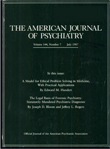Cocaine, Ethanol, and Genotype Effects on Human Midbrain Serotonin Transporter Binding Sites and mRNA Levels
Abstract
OBJECTIVE: Earlier platelet and postmortem brain studies have found alterations in serotonin transporter function in ethanol-abusing human subjects. The present investigation tested the hypothesis that brain serotonin transporter function is altered in chronic users of ethanol and cocaine, which might be related to a common serotonin transporter promoter polymorphism. METHOD: Serotonin transporter binding sites, serotonin transporter mRNA levels, and serotonin transporter promoter variants were quantified in postmortem samples from a group of human subjects who had been ethanol users or cocaine users and then compared to those of a matched group of comparison subjects. Quantitative autoradiographic and in situ hybridization assays were performed in midbrain samples that contained the dorsal and median raphe nuclei (the location of serotonin cell bodies that innervate the forebrain). RESULTS: There was a significant overall cocaine-by-ethanol-by-genotype interaction. Dorsal raphe [125I]CIT binding to the serotonin transporter was lower in cocaine users than in comparison subjects. In addition, serotonin transporter binding and serotonin transporter mRNA levels varied significantly by genotype. It was also found that serotonin transporter binding in subjects with either the short or heterozygote genotype was significantly higher in the ethanol-user subjects. CONCLUSIONS: Serotonin transporter binding sites were regulated in a region-specific and substance-specific pattern, which was not simply a local response to functional blockade. Also, a reciprocal relationship appeared to exist between cocaine and ethanol effects in the dorsal raphe, which may have interesting clinical implications for dual-diagnosis patients. It is possible that serotonin transporter promoter genotype may play a complex role in chronic ethanol dependence. (Am J Psychiatry 1998; 155:207–213)



